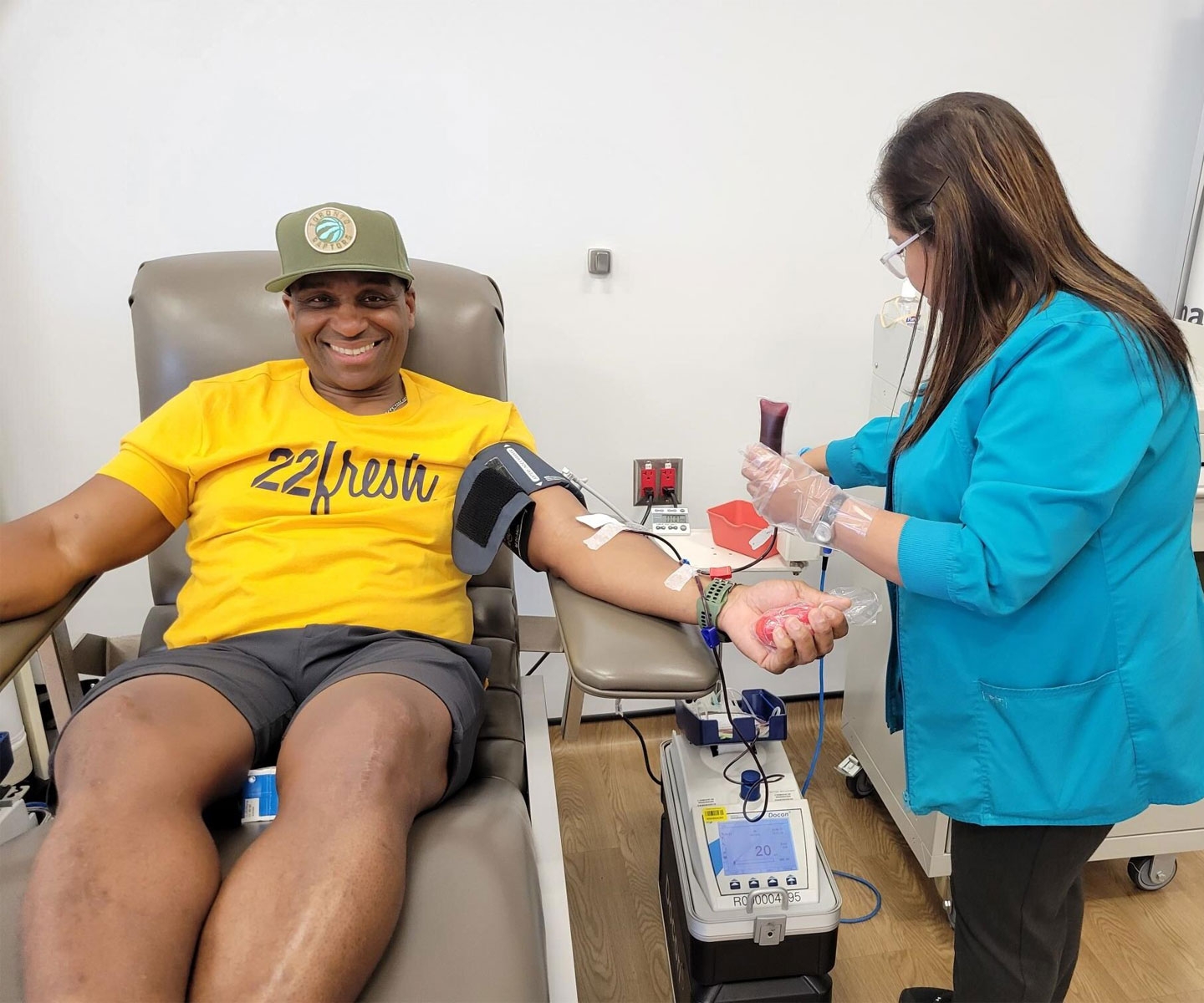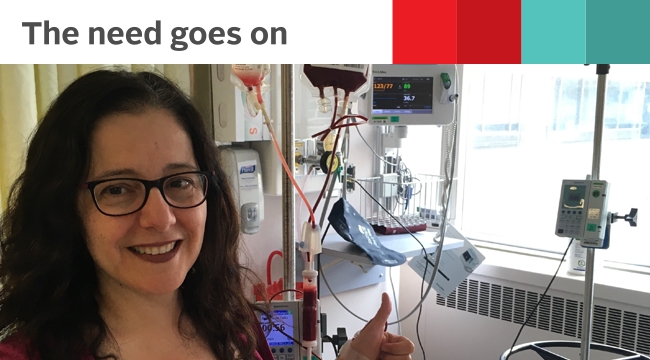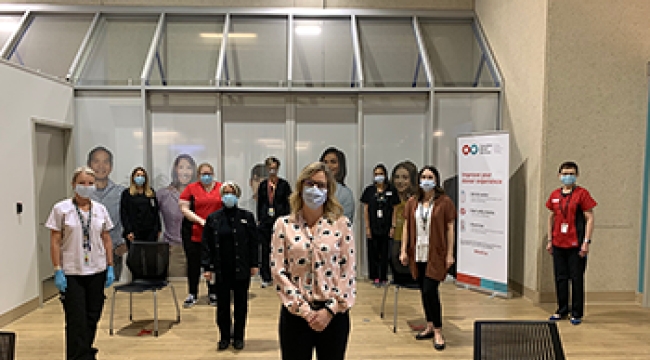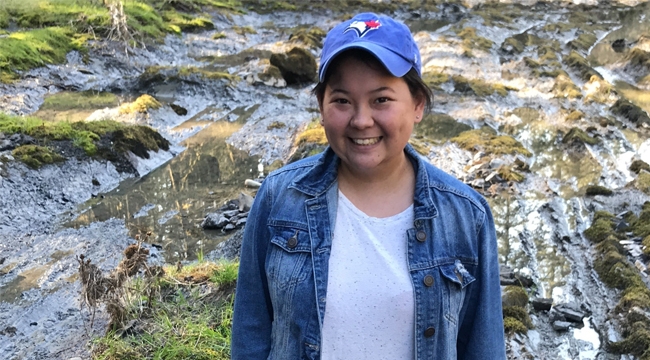This donor’s rare blood travelled 6,000 kilometres to save a life

Jason Daum first learned of his exceptionally rare blood type after one of his first donations in years was selected for special tests
Jason Daum is a giver. It’s just who he is, he says. It’s how he understands the world.
“I just think it's an important part of how we actually make others around us better, and how we make ourselves better,” says Jason, the owner-operator of a renovation company in Regina, Sask. “I actually believe that it's truly part of who I am.”
But he certainly never expected to give the way he did last spring — by donating blood for a patient across the ocean. It turns out his blood type is so unusual, only a handful of blood donors in the world are known to have it. And someone else with that type, a patient, happened to need a transfusion in June.
Becoming a rare blood donor
Jason first donated blood about 18 years ago when he was 17. He gave regularly before falling out of the habit. When he came back about 10 months ago — after his daughter donated and gave him a little nudge — the procedure was a bit different. He was given the opportunity to specify his ethnicity in a questionnaire.
Jason selected “Black”. His choice to answer that question directly led to the discovery of his rare blood type, putting him on the path to his momentous donation a few months later.
To understand why, you need to know a little bit about blood types. Every red blood cell in your body is coated with molecules called “antigens.” While a handful of these determine the major blood groups (A, B, AB, and O, all of which can be positive or negative for the Rh factor), there are hundreds of other antigens as well. If you have unusual ones, or are missing antigens that most people have, your blood type could be “rare” — occurring in fewer than 1 in 500 people — even if you have a very common ABO and Rh combination, such as O-positive.
Additionally, because antigens are inherited, profiles that are common in one ethnic group may be less common in another. And while anyone can have a rare blood type, some rare types are found only in people of particular ancestral backgrounds.
This is why, in 2022, Canadian Blood Services began asking donors for more detail about their ethnicity. If you answer the ethnicity question, we may then do a DNA analysis of your donated blood, to understand your antigens at a genetic level (while respecting your privacy by not analyzing other genetic information). This process, called “genotyping,” is already yielding incredible results. For example, by genotyping donors who identify as Filipino, we’ve tripled our discovery of donors in Canada with a rare blood type called “JK3”.
Finding rare blood donors is critical, because while donor genotyping is not essential for most patients who need transfusions, some with unusual antigens or antigen combinations develop antibodies. These patients may suffer a dangerous immune reaction if given blood that is not matched to them accordingly. They greatly benefit from efforts to increase genotyping as well as to build a more diverse donor base.
Learn more about why we need a diverse donor base

‘I have a responsibility to make sure that I continually give blood’
Jason’s exceptionally rare blood type was discovered when he was selected for genotyping.
“He was negative for two Dombrock antigens. One is Joa and the other one is Hy or Holley,” says Dr. Matthew Yan, who leads the Rare Blood Program at Canadian Blood Services. “It's rare to be negative for one of them, and it's even rarer to be negative for both of them, but it does happen within the Black population.”
Knowing that only a handful of people in the world share his blood type has filled Jason with a sense of duty.
“What it means for me personally is that I have a responsibility to make sure that I continually give blood,” Jason says. “When I get that reminder, I just need to make sure I make the time. Because that's really what it is. It's just making the time to do it.”
The need for rare blood crosses international borders
While nearly all blood donated in Canada is used for patients in this country, rare blood is also a precious international resource.
“Any time we find a rare donor in Canada, it makes us really excited, because not only does it help patients in Canada, it could help anyone in the world,” Dr. Yan says. Patients in Canada also benefit from matches with donors abroad.
Cross-border matches for patients are facilitated by the International Rare Donor Panel, a collaboration between countries around the world which tracks rare blood donors and can help search for a match.
It was one such search last spring that identified Jason as a match for a patient in Ireland who needed blood. At the time, however, Jason’s recently renewed enthusiasm for donating actually posed a challenge. Male donors aren’t normally eligible to donate for at least 56 days after their last appointment, to protect their own health; when the call came, Jason was still in a recovery period.
Fortunately, Canadian Blood Services was able to assess Jason’s specific health situation, to ensure he could make this exceptional donation safely.
“We looked at things like his hemoglobin, what his trends were, and he was always pretty robust,” Dr. Yan says. “So, I felt quite comfortable that he could come in early, and we wouldn't have a problem with his hemoglobin cutoff.”

Going the extra mile for patients in need of rare blood
A test confirmed Jason’s hemoglobin was indeed high enough for donation to proceed. So he was booked to donate for the overseas patient — though there was some additional drama in store.
On appointment day, Jason didn’t arrive on time, and as the donor centre approached closing time, staff began to fret. Fortunately, they reached him and discovered he’d made a mistake that could easily happen to anyone — putting the appointment in his calendar with the wrong time zone.
As soon as he discovered the error, Jason dropped everything and rushed to the now-closed donor centre, where staff had stayed late with an off-duty supervisor who’d also come in for the event.
“They were waiting there, and I kind of felt special because, there were some people that weren't actually working that came just to be a part of it,” Jason says.
Jason and the employees at the donor centre weren’t the only ones to go the extra mile. Extra blood was drawn to send to Ireland for their own EU-required testing and as soon as the donation was collected, it was whisked off to another Canadian Blood Services facility for processing, and then to a warehouse where it was packaged in a temperature-controlled container and shipped to Ireland.
For privacy reasons, it’s unlikely that Jason will ever find out who received his blood or why they needed it. But that doesn’t diminish the wonder of the whole experience.
“As far as I'm concerned, that part is really irrelevant. It's that I'm there helping somebody, and I have the ability to do it,” Jason explains. “I'm glad I was able to be a part of this, and my hope is that I can just continue going.
“I think I'm at 52 donations right now, and I hope I have the ability to continue to donate for many more years.”
Every day, patients need blood from donors whose blood type matches their own. Canadian Blood Services encourages people of all backgrounds to donate blood to help meet the needs of all patients. Your donation could help save a life. To book an appointment, download the GiveBlood app, book online, or call 1 888 2 DONATE (1-888-236-6283).


